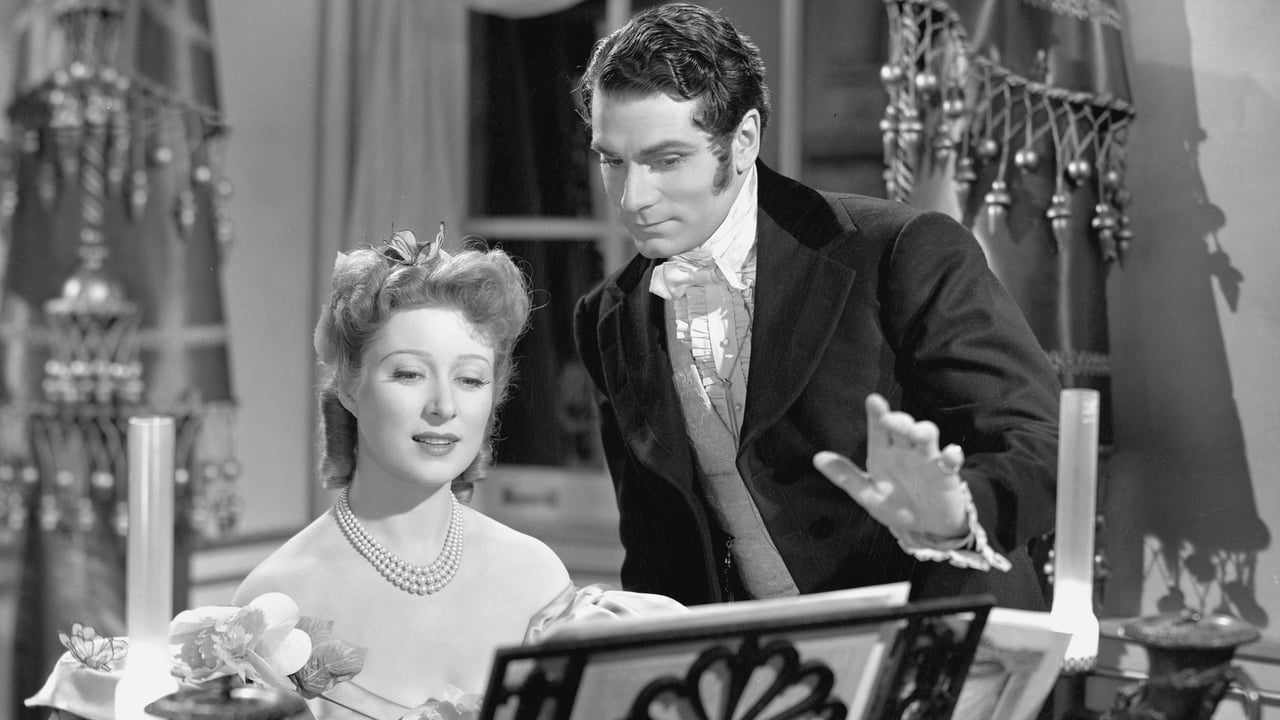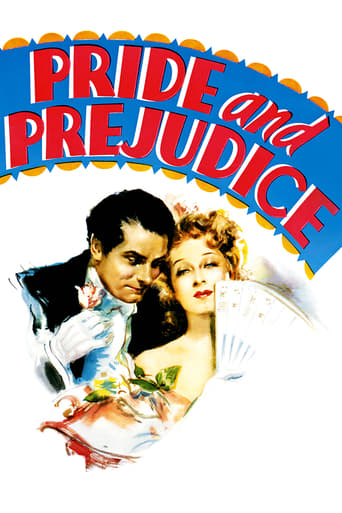

Just so...so bad
... View Morei know i wasted 90 mins of my life.
... View MoreBest movie ever!
... View MoreAm I Missing Something?
... View MoreThe 1940 "Pride and Prejudice" is a good, if 'Hollywoodized' version of Jane Austin's famous novel. Greer Garson is at least 15 years too old to play Elizabeth Bennet, the film is set 30 years later than the novel (supposedly to allow use of the sumptuous gowns left over from "Gone with the Wind") and the ending has been sweetened. Never-the-less, the film remains quite enjoyable. Although not really looking the ingénue, Garson is quite good, as is Olivier, who plays the misunderstood Mr. Darcy. The rest of the cast are fine, especially Ed Quinn as Mr. Bennet. All in all, a good version of the oft-filmed romance.
... View MoreJane Austen's novel "Pride and Prejudice" was originally written in 1796/7 but not published until 1813. Most producers of television adaptations have been guided by the latter date and have set the story during the Regency period, although the 2005 film version was set in the 1790s. This film, however, shifts the action to the 1830s or 1840s, that is to say 20 or 30 years after Austen's death. Two explanations have been given for this change. The official one is that the studio, MGM, wished to use more flamboyant costumes than the relatively restrained and simple ones of the Regency era. The other is that MGM had recently made another film set during the early Victorian period and wanted to re-use the sets and costumes. The film was originally intended to be in colour, to which it would have been well suited, but ended up being made in black-and-white because "Gone with the Wind" had used up all MGM's stocks of colour film.I will not say much about the plot because it is so well-known. The film does, however, differ from the novel in a number of ways. Most of these are fairly minor; whenever a novel is adapted for the screen some scenes will inevitably need to be shortened or omitted altogether if the film is not to become intolerably long-winded. In the novel the insufferable Mr. Collins was a clergyman, here he becomes a librarian, a change driven by the Production Code which forbade unsympathetic portrayals of the clergy. (This piece of censorship would have disappointed the devoutly Christian Austen, who was using Collins to satirise those who entered the priesthood out of mercenary, self-seeking motives rather than genuine religious feelings). The film ends with all five Bennet sisters married or about to be married, unlike the book which ends with only Jane, Elizabeth and Lydia married or engaged.Perhaps the most significant change is that made to the character of Lady Catherine de Bourgh, in the novel a monstrous old snob and hypocrite but whose personality is here considerably softened, again blunting Austen's satire. She is still a formidable old lady, but is actually sympathetic towards Elizabeth's proposed marriage to Darcy, something which in the book she does her damnedest to prevent.The film was made in the United States by an American studio, but in the thirties Hollywood was generally respectful towards the British classics so Austen's English setting is kept. (This would not be something we could take for granted today; when Alfonso Cuaron made a film of Dickens's "Great Expectations" he not only switched the action to America but also gave it a contemporary setting). This meant that the cast, most of whom were American themselves, had to put on their best English accents, and most cope well with the challenge, although one or two occasionally slip.Laurence Olivier, who here plays the proud Mr. Darcy, had the previous year acted in another adaptation of a nineteenth-century classic, "Wuthering Heights". Superficially Heathcliff and Darcy are quite different characters, but both are passionate men, the difference being that in Darcy's case his passion is constrained beneath a formal exterior of manners and breeding. With Olivier's performance one always senses the strong emotions hidden beneath his immaculately starched shirt. With all due respect to admirers of Colin Firth's interpretation, and of Matthew MacFadyen's (if he has any), Sir Laurence is still for me the greatest Mr. Darcy.As for Greer Garson as the prejudiced Elizabeth Bennet, she is fine if one can overlook the fact that at 36 she is considerably older than the character imagined by Jane Austen (21 in the book). In the early nineteenth century young women were regarded as being well on the way to becoming an old maid if they were still unmarried in their late twenties, like Charlotte Lucas here or Anne Elliott in "Persuasion". Austen would have been very surprised had she known that in the twentieth century her heroines would be played by actresses in their late thirties. The original choice for Elizabeth was Norma Shearer, two years older even than Garson. Emma Thomson was a similar age when she played Elinor in "Sense and Sensibility", but that seems to matter less as the ultra-sensible Elinor is very much an old head on young shoulders. Nevertheless, Garson brings out well Elizabeth's determination and sense of self-respect; we sense that she and Darcy are a fine match for one another.Maureen O'Sullivan makes a sweet and lovable Jane, even if she is one of those who occasionally let their accents slip. (O'Sullivan is best remembered today for playing another Jane, in the "Tarzan" films). I also liked Edmund Gwenn as Mr. Bennet; the contribution I liked least came from Edna May Oliver as Lady Catherine, although the fault may lie less with the actress than with the changes made by the scriptwriter.Now that Jane Austen is so firmly established as good box office, it is strange to think that this "Pride and Prejudice" was the first feature film to be based on her work. Stranger still that it remained the only one until the nineties. It is very different from a modern "heritage cinema" adaptation, but as an example of a 1940s romantic comedy it is an excellent one, keeping a lot of Austen's wit and powers of characterisation. 9/10A goof. We see carriages driving on the right-hand side of the road, but we Brits drive on the left, and did so even in the horse-and-carriage days of the nineteenth century.
... View MorePride and Prejudice (1940): Dir: Robert Z. Leonard / Cast: Greer Garson, Lawrence Olivier, Mary Boland, Edna May Oliver, Maureen O'Sullivan: Overrated contrived drivel about status, class and wealth. It is one of those opposites attract romantic films where one hates the other while viewers already know what these airheads fail to realize. And listening to Greer Garson accuse Lawrence Olivier of being proud, while he counters about her being a tight ass quickly turns the film into a corny manipulative chore to sit through. Director Robert Z. Leonard does his best and he is backed by superb sets and art direction as well as appealing locations. The screenplay however jerks us around with Greer refusing to dance with Olivier and vice versa before they embrace with that final shot long kiss that is gut wretchingly predictable at best. In supporting roles there is Mary Boland who apparently wants her daughters not only to marry, but to do so in a wealthy family. She spends much of the film feeling ill and making viewers feel the same. Then there is Edna May Oliver as Lady Catherine who comes off as stuck up and arrogant. Maureen O'Sullivan plays Garson's sister and she is about as bland as the rest of the cast here. The point of the film addresses our finger-pointing methods of distinguishing a person's worth but the real oversight is the popularity of this undeserving charade. Score: 5 / 10
... View MoreThe 1940 version of Pride and Prejudice is what I think of as a typical MGM movie of the Golden Age. Of course, MGM made many other types of picture, but they were particularly associated with this kind of 'prestige' movie. It is a big, expensive production, based on a world famous book, written by an eminent literary figure (Aldous Huxley), with lavish sets and sumptuous costumes, starring their most prestigious English actors. In other words: portentous, showy and completely empty.This movie is all packaging and no content.It goes without saying that it is a travesty of the book, but it is hopeless even as a simple exercise in story-telling. It would be easy to deplore it for its technical incompetence, its wild historical inaccuracy and its somewhat trashy notion of elegance and sophistication, but I suspect that would be missing the point.In 1939, when this movie was being planned, America was still mired in the Great Depression and there were millions of women who had been struggling to make ends meet for the best part of a decade. What they wanted from MGM was to be transported out of the grim reality of their own lives into a fantasy world of opulence and ease; of glamour, luxury and elegance. That is what movies like Pride and Prejudice were designed to do. I can complain that the plot is, at best, perfunctory, but who cared? The story was almost incidental to its core audience. It was the over-the-top costumes, the soaring sets, the glittering chandeliers and the gleaming carriages that the audience really wanted to see.The packaging was the point!For example, the costumes are absurd – they are not only wrong for that period, they are probably wrong for any period. However, I am sure the MGM costume department could have designed gowns that were authentic down to the last button, if that was what MGM had wanted – but they didn't. And who am I to say that they were wrong? MGM was the only Hollywood studio that went right through the Great Depression without ever making a loss. They must have been doing something right.When I view this movie today, I know I must try to understand why it was made the way it was. This vision of Regency England may have been very naïve and very fanciful, but there is no reason to suppose that the people that made the movie were naïve: or even that the people in the audience were. I know I have to put myself into the position of that audience if I am to enjoy it in the way that was originally intended, but I cannot do that. I have to judge the movie on the basis of how it looks today, in the context of other movies of the era, not how it might have looked then.From that perspective, it has not lasted well. Nor, I suspect, have MGM movies as a whole. From the very beginning of the Thirties, Hollywood churned out scores and scores and scores of movies that are still highly watchable today. You don't have to be a movie buff or film historian to enjoy Universal horror films, Warner Brothers gangster movies, RKO musicals, Disney animations or the Westerns, 'screwball' comedies, romances, melodramas, thrillers, historical pictures and other movies that flooded out of Hollywood at that time. Until the last twenty years or so they were part of everyone's film education.MGM was the biggest and most successful studio of the Thirties, but my gut feel is that fewer of their movies have stood the test of time than those of most of their competitors. Too many look like Pride and Prejudice: frothy, over-stuffed, over-egged but ultimately unsatisfying: timely but not timeless.This movie is of undoubted historical interest as a representative artifact of Hollywood at a particular time in its history, but from any other perspective it is utterly negligible.
... View More